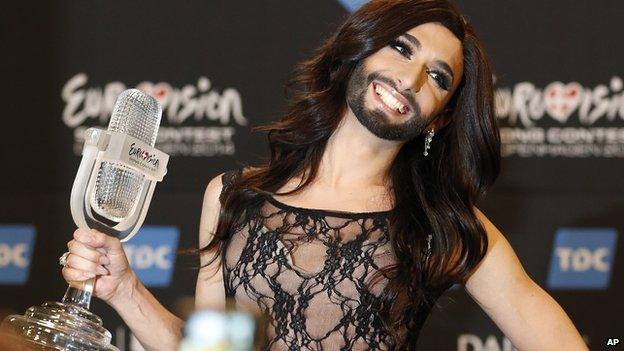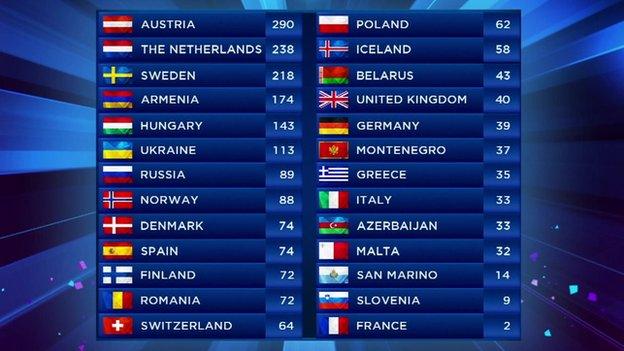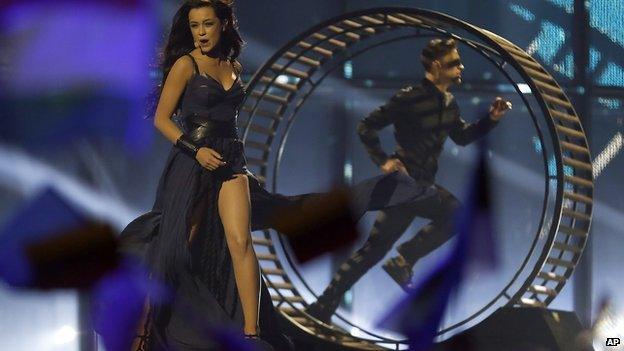Austria wins Eurovision Song Contest
- Published
- comments
Austria's Conchita Wurst: "This night is dedicated to everyone who believes in a future of peace and freedom"
Austrian drag act Conchita Wurst has been crowned the winner of the 59th annual Eurovision Song Contest held in Denmark's capital, Copenhagen.
The singer, whose real name is Tom Neuwirth, won with the song Rise Like a Phoenix, collecting 290 points.
The Netherlands finished second with 238 points, with Sweden in third place with 218 points.
The UK's Molly Smitten-Downes came 17th, with 40 points for her song Children of the Universe.
It is the first time Austria has won the contest since 1966, and only the second time the country has competed in the final in the past 10 years as it either did not participate or qualify.

Conchita Wurst had been second favourite to win going into the contest

The final Eurovision scoreboard at the end of voting
Wurst had been the second favourite to win behind Sweden going in to the competition, with many predicting the act could be too divisive among voters.
However she was the clear winner, with her victory announced after 34 of the 37 countries had submitted their scores.
Collecting her trophy on stage the singer said: "This night is dedicated to everyone who believes in a future of peace and freedom. You know who you are - we are unity and we are unstoppable."
Speaking backstage later, Wurst said she felt Europe had taken a stand by voting her the winner.
"I dream of a world where we don't have to talk about unnecessary things like sexuality, who you love. I felt like tonight Europe showed that we are a community of respect and tolerance," she said.
UK act Molly was the last up to perform in Copenhagen
Smitten-Downes, who closed the performances, had been tipped to score highly with bookmakers placing her in the top five.
She received points from only nine countries: San Marino, Denmark, Malta, Iceland, Norway, Ireland, Spain, Belgium and Georgia.
Her result was still better than the UK's entry last year, when Bonnie Tyler finished 19th on the final scoreboard with 23 points.
The evening's events were overshadowed by the current events in Ukraine, with Russia's entry - The Tolmachevy Sisters - receiving boos from the audience during the results when countries including Azerbaijan awarded them the highest number of points.
When Russia's delegate appeared on screen to announce its votes - seven points of which were for Ukraine - more booing could be heard. Ukraine gave four points to Russia in return.
Russia ended the night in seventh place with 89 points, behind Ukraine with 113.
The Tolmachevy Sisters received points from 14 countries, compared with last year's Russian entrant who received votes from 27 countries.
Live coverage of Eurovision cut to a surprised Graham Norton

Ukraine's Mariya Yaremchuk was the first to perform on stage
The contest featured the usual mix of pop tunes and ballads, accompanied by spectacular stage performances.
Ukraine kicked off the show with a man in a giant hamster wheel, while Greece included a trampolinist and Poland offered a number of busty performers who suggestively churned butter and washed laundry on stage.
In total 26 countries performed at the B&W Hallerne arena for an expected television audience of more than 120 million fans.
Overnight UK ratings indicated an average 8.8 million people tuned in to watch the contest, peaking at 10.6 million at 23:00 BST during the results. Some 10.1 million watched Smitten-Downes' performance at 21:55.
Figures released on Sunday showed Eurovision generated 5.4 million tweets on social media, with a peak Twitter activity of 47,136 tweets per minute when Wurst's victory was announced.
The final scorecard can be found on the Eurovision website, external.